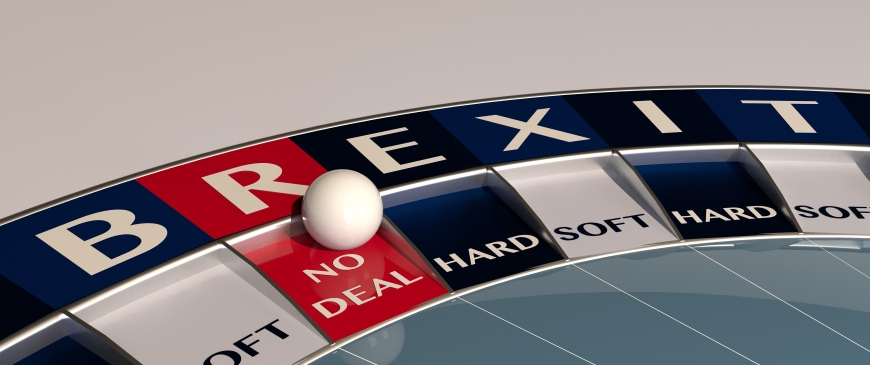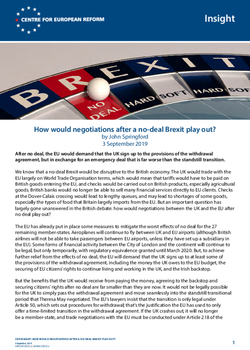
How would negotiations after a no-deal Brexit play out?
After no deal, the EU would demand that the UK sign up to the provisions of the withdrawal agreement, but in exchange for an emergency deal that is far worse than the standstill transition.
We know that a no-deal Brexit would be disruptive to the British economy. The UK would trade with the EU largely on World Trade Organisation terms, which would mean that tariffs would have to be paid on British goods entering the EU, and checks would be carried out on British products, especially agricultural goods. British banks would no longer be able to sell many financial services directly to EU clients. Checks at the Dover-Calais crossing would lead to lengthy queues, and may lead to shortages of some goods, especially the types of food that Britain largely imports from the EU. But an important question has largely gone unanswered in the British debate: how would negotiations between the UK and the EU after no deal play out?
The EU has already put in place some measures to mitigate the worst effects of no deal for the 27 remaining member-states. Aeroplanes will continue to fly between UK and EU airports (although British airlines will not be able to take passengers between EU airports, unless they have set up a subsidiary in the EU). Some forms of financial activity between the City of London and the continent will continue to be legal, but only temporarily, with regulatory equivalence granted until March 2020. But, to achieve further relief from the effects of no deal, the EU will demand that the UK signs up to at least some of the provisions of the withdrawal agreement, including the money the UK owes to the EU budget, the securing of EU citizens’ rights to continue living and working in the UK, and the Irish backstop.
Far from ending Brexit, no deal would place Britain in a far worse negotiating position with the EU.
But the benefits that the UK would receive from paying the money, agreeing to the backstop and securing citizens’ rights after no deal are far smaller than they are now. It would not be legally possible for the UK to simply pass the withdrawal agreement and move seamlessly into the standstill transitional period that Theresa May negotiated. The EU’s lawyers insist that the transition is only legal under Article 50, which sets out procedures for withdrawal; that’s the justification the EU has used to only offer a time-limited transition in the withdrawal agreement. If the UK crashes out, it will no longer be a member-state, and trade negotiations with the EU must be conducted under Article 218 of the EU’s Treaty on the Functioning of the EU, which gives any of the 27 member-states and the European Parliament a veto over any trade deal that goes beyond tariffs, quotas and goods standards.
So what would the UK get for signing up to some or all of the provisions of the withdrawal agreement in a no-deal scenario? The EU and the UK could agree a goods-only deal that covered tariffs and quotas in an attempt to unblock the Dover-Calais crossing. Such a deal would not be a ‘mixed competence’ agreement, so it would not require a lengthy ratification process by both the EU’s institutions and the member-states. The EU has exclusive competence over goods trade, and could offer a quick deal eliminating tariffs and quotas, which would only have to be ratified by qualified majority at the Council and by the European Parliament. Goods standards, especially in agriculture, would be more difficult, because the EU would insist that the UK could not diverge from EU standards, and demand enforcement mechanisms to prevent that from happening, but such a deal is possible. The EU would probably insist upon a review clause so that the agreement could be suspended if negotiations over the long-term trade deal broke down.
But most of the costs of Brexit result from higher regulatory barriers in services and an end to free movement, and in these areas the EU would not offer anything close to the terms of the transition, which allows the UK to remain in the single market. A more comprehensive deal that gave Britain membership of the single market, like the transition, would require ratification by national and some regional governments. While the Council and Parliament could provisionally apply some elements of a more comprehensive deal quickly and allow ratification to happen later, there is still the risk it could be hampered by a national or regional government. France and Belgium would be most difficult: both countries are sceptical about trade agreements and have been particularly tough in the Brexit negotiations, and the Walloon regional parliament initially rejected the Canada-EU free trade agreement in 2016 (although it subsequently backed down).
After no deal, the EU would demand that the UK sign up to the provisions of the withdrawal agreement, but in exchange for an emergency deal that is far worse than the standstill transition.
As for so-called mini-deals to mitigate the disruption, the EU will only act unilaterally to protect its own interests, rather than concluding bilateral agreements with the UK to help to solve the problems on the British side of the Channel. Michel Barnier stressed this point in a Daily Telegraph article on August 31st. The European Commission could offer some further mitigation by granting more equivalence decisions in financial services, if banks and other companies based in the EU are experiencing serious problems in particular markets. But the EU’s equivalence regime does not cover many areas of financial services. And the EU would not be willing to create a wider equivalence regime for the UK, especially one that covers agriculture and food, car standards and medicines. The European Commission does not have the power to do so under EU law, and even if it did, by expanding equivalence the EU would open itself to demands from other countries that they are offered the same benefits.
So the UK should expect additional help with the effects of no deal to be limited. The offer would be: sign up to the provisions of the withdrawal agreement and we will help as much as we can with mitigation on goods, and open negotiations for the long-term trade deal, which we will try to conclude as quickly as possible.
It is difficult to see how the current state of British politics would provide a government that was able to quickly negotiate and ratify that deal. The Conservatives only have a majority of one thanks to the confidence and supply arrangement with the Democratic Unionist Party. If Boris Johnson managed to force the UK out of the EU without a deal, a general election would come soon after. The electorate is split on the Brexit issue, and neither Labour nor the Conservatives look likely to achieve a majority, and thus would be unable to ram through a swift trade deal with the EU.
Neither would the EU find it easy to agree on long-term arrangements with the UK. The 27 have competing interests when it comes to the deal. Spain might cause trouble over Gibraltar. There would be arguments over fishing rights, agriculture, finance, broadcasting and data flows between EU member-states. And because the amount of trade that is conducted between EU and the UK is fairly large, member-states would be tougher in their negotiations with each other about the provisions of the deal with the UK.
No deal would leave the UK in a far worse situation than Theresa May’s detested withdrawal agreement.
We have to conclude, then, that no deal would be a serious rupture that would be very difficult to repair. Trust between Britain and the EU would be very badly damaged with each side blaming the other. Ultimately, geography and mutual economic interests may drive the UK and the EU towards a close relationship. But the economic effects of no deal may persist for several years, raising the risk of a hard border on the island of Ireland and of the break-up of the UK, and doing lasting damage to the British economy. No deal would leave the UK in a far worse situation than May’s rejected withdrawal agreement. Politicians who care about the security and prosperity of the British people must do all they can to prevent it.
John Springford is deputy director of the Centre for European Reform.


Add new comment